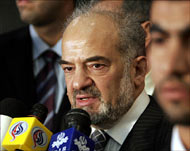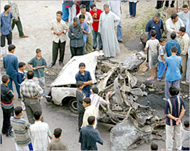Regional players discuss Iraq’s future
Top officials from countries neighbouring Iraq have met in Istanbul to welcome the formation of a government in Baghdad.

The meeting was aimed at giving the new government a boost despite regional fears of instability in the country.
Iraq’s National Assembly approved the country’s first popularly elected government on Thursday, after nearly three months of wrangling over key government posts.
Iraq’s six neighbours – Jordan, Syria, Kuwait, Iran, Turkey, and Saudi Arabia – and regional heavyweight Egypt, are expected to welcome the new government of Prime Minister Ibrahim al-Jafari during a meeting of foreign ministers in Istanbul on Saturday.
Many neighbours are deeply concerned that violence in Iraq could destabilise the region, although they also remain divided about the country’s future.
Support sought
On Friday, top officials from the countries in the region met to set the agenda for Saturday’s foreign ministers’ meeting. The officials also drafted a communique to be adopted by the ministers that will be carefully watched by the United States and international community.
 |
|
Al-Jafari has not yet made |
Diplomats at Friday’s meeting said the draft expressed support for the new government, stressed the political integrity and sovereignty of Iraq, and called for international support for the war-ravaged country.
“We have a shared and common interest with our neighbours to improve regional cooperation,” Iraq’s Foreign Minister Hushiar Zibari said before the meeting.
“We also need our neighbours to support the new government and to support the stability in Iraq to help Iraq overcome its problems.”
Al-Jafari stays at home
Al-Jafari had hoped to come to Istanbul, but in a sign of the struggle still facing the new government, he had to stay at home for negotiations to finalise the new government, diplomats said.
 |
|
There are fears the violence in |
Al-Jafari must still make key appointments, including naming two deputy prime ministers. Five ministries, including the defence and oil slots, have also been left in the hands of temporary managers.
Many neighbours see the formation of a new government as a key step towards bringing stability to the country, but are concerned that violence plaguing the country could destabilise the region.
“We congratulate the new government on the confidence that it received from the national assembly,” Syrian Foreign Minister Faruq al-Shara said in Istanbul.
Neighbours divided
Arab League spokesman Husam Zaki said: “We welcome the formation of the new government as a response to the aspirations of the Iraqi electorate and we look forward to seeing the aspirations of the Iraqi people fulfilled through a comprehensive participation of all Iraqi political actors in the political process.”
|
“We don’t believe that the government will solve the problems of an occupied Iraq. We don’t trust the government” Harith al-Dhari |
Although the neighbours agree on the need for stability, they are sharply divided about the shape of the new government.
Sunni-dominated neighbours, including Egypt, Jordan, and the Gulf countries, worry that Sunni under-representation will sidestep the once powerful group and undermine their influence in their oil-rich neighbour.
“We don’t believe that the government will solve the problems of an occupied Iraq. We don’t trust the government,” Harith al-Dhari, head of the Association of Muslim Scholars, an influential group of Sunni clerics, told Turkey’s Anatolia news agency.
“We don’t see hope because the occupation is continuing.”
Iranian influence
With Iraq’s Shia increasingly vocal, many neighbours are also concerned about Iran’s growing prominence.
Other countries, such as Turkey, Iran and Syria, fear that the strong influence of Iraqi Kurds in the government could allow them to push for an independent state and embolden Kurds in neighbouring countries to take a similar path.
The presidency, foreign ministry and at least a half dozen
other ministerial posts are held by Iraqi Kurds.
The concern is especially strong in Turkey, which has been battling its own Kurdish rebels in the southeast since 1984, a fight that has left 37,000 dead.
Zibari, however, dismissed concerns about growing Kurdish and Shia influence.
“They shouldn’t worry about it. They are not Shia or Kurds, they are Iraqis. They are building a unified Iraq,” he said.